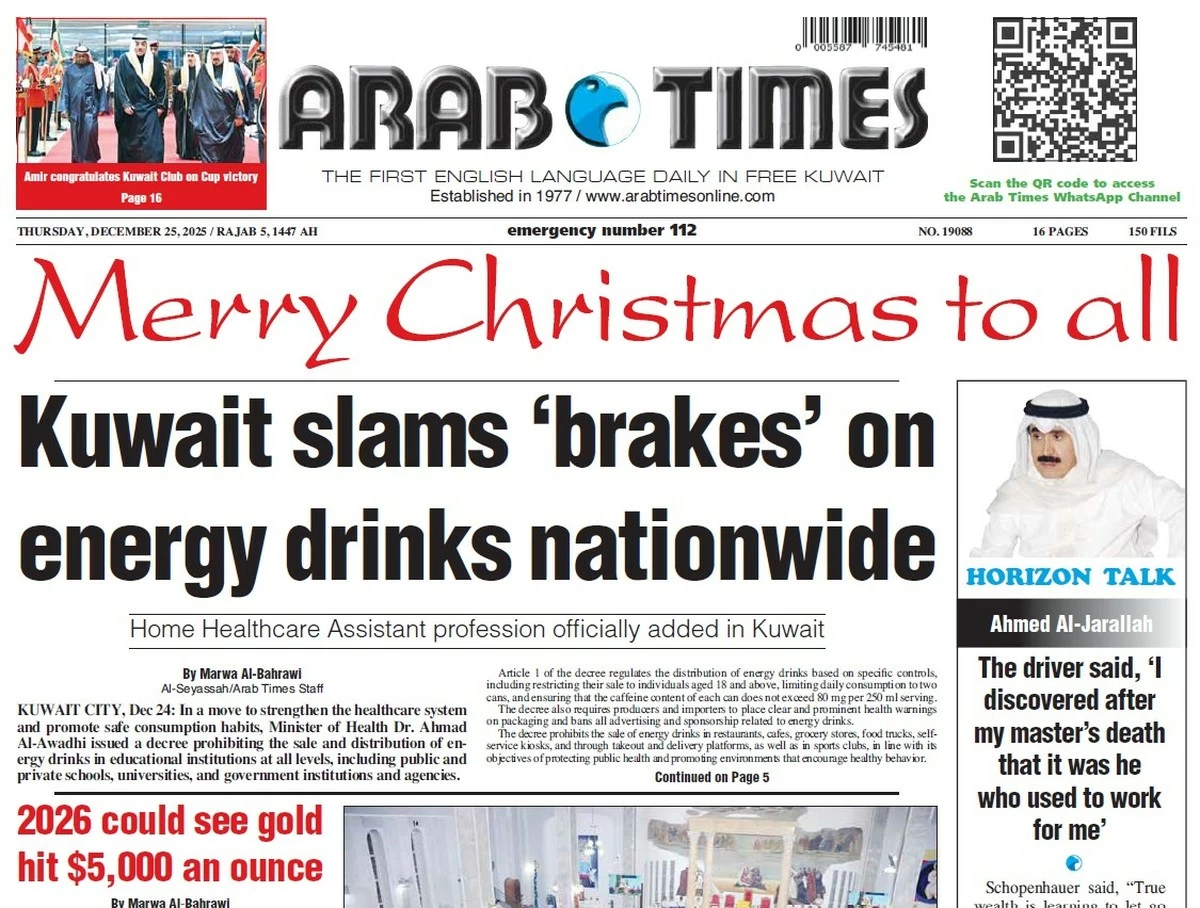18/11/2025
18/11/2025

CAIRO, Nov 18: Kuwait reaffirmed its commitment to advancing sustainable development goals that strengthen the status of women, including women with disabilities, Director General of the Public Authority for Disability Affairs Dr. Dalal Al-Othman said Monday at a regional conference in Cairo.
Speaking before the Fifth Regional Conference of the Arab Forum of Women with Disabilities (AFOWD), Al-Othman stressed that Kuwait is focused on applying the principles of justice and equality and aligning national development plans with women’s empowerment goals.
Al-Othman said that providing women with disabilities equal opportunities in education, employment, entrepreneurship, and social inclusion is key to enabling them to become independent leaders and productive partners in society. She noted that Kuwait has integrated women into the labor market as part of the government’s work program and set indicators to measure women’s participation as part of its development priorities.
She highlighted Kuwait’s efforts to provide inclusive education from kindergarten through university, in addition to support through accredited rehabilitation centers and institutions. This approach, she said, reflects Kuwait’s belief that genuine development can only be achieved through the participation of all segments of society without discrimination.
The conference, held under the theme “Economic Empowerment, Entrepreneurship, Inclusion, and Social Protection for Women and Girls with Disabilities,” also featured a detailed address by Al-Othman during the second plenary session. She emphasized that the Second Arab Decade for Disability (2023–2032) reaffirms a collective regional commitment to promoting rights, inclusion, and equal opportunities for women and girls with disabilities.
Al-Othman outlined persistent challenges facing women with disabilities across the Arab region, including limited access to appropriate job opportunities, restricted financing and technical support, and social and digital discrimination. She said women in Kuwait have established themselves across political, economic, social, and sports sectors, holding ministerial posts and leadership positions in government bodies and civil society organizations. Ten women currently head disability-related civil society organizations, she noted, while five women have led the Public Authority for Disability Affairs between 2010 and 2025.
She added that women occupy 62.3 percent of supervisory roles within the Authority—53 positions out of 85—while 49 women with disabilities are employed at the Authority, representing 23.6 percent of its 207 employees with disabilities. The Authority, she said, operates within the national development framework to promote inclusive employment, accessible workplaces, and digital accessibility.
In housing, Al-Othman highlighted the first-ever lottery conducted by the Women’s Housing Affairs Committee of the Public Authority for Housing Welfare for female citizens with disabilities, resulting in the allocation of 214 housing units.
She also detailed extensive social protections guaranteed by Law No. 8 of 2010, including monthly allowances, housing grants, mortgage loans, reduced work hours, retirement benefits, disability pensions, assistive devices, and domestic worker allowances. Kuwait has further launched an initiative to integrate persons with disabilities into small and medium-sized enterprises (SMEs), supervised by the Supreme Council for Planning and Development and implemented by the National Fund for SME Development.
She noted Kuwait’s adoption of the “Kuwait Accessibility Code,” developed according to design standards approved by the Public Authority for Disability Affairs, and a memorandum of understanding with the W3C GCC Chapter to update digital accessibility requirements.
Al-Othman emphasized Kuwait’s commitment to providing inclusive education and rehabilitation support to ensure quality learning opportunities for all people with disabilities. She called for transforming the objectives of the Arab Disability Decade into practical initiatives that support the empowerment and independence of women and girls with disabilities.
The conference, which brings together Kuwait and other Arab states, is part of the Beijing+30 review process and the Arab Disability Decade initiatives.
In opening remarks, Director General of the Arab Organization of Persons with Disabilities (AOPD) Jahda Abou Khalil said the event establishes an ambitious roadmap for advancing the rights of women with disabilities. She said the Beijing+30 review confirms that empowering all women is essential to comprehensive development.
Tareq Al-Nabulsi, Director of Development and Social Policies at the Arab League’s Social Affairs Sector, said the conference brings together organizations addressing both regional and international dimensions related to disabilities. He emphasized the need for strengthened intervention amid the humanitarian crises in Gaza and Sudan, particularly regarding people with disabilities.
President of the International Disability Alliance (IDA) Nawaf Kabbara noted that the region faces significant challenges, adding that the IDA has integrated women’s disability rights and gender equality into its core framework. He called for stronger human-rights advocacy, especially for women in Gaza and Sudan.
Kuwait participated in the conference with a delegation headed by Dr. Dalal Al-Othman.


